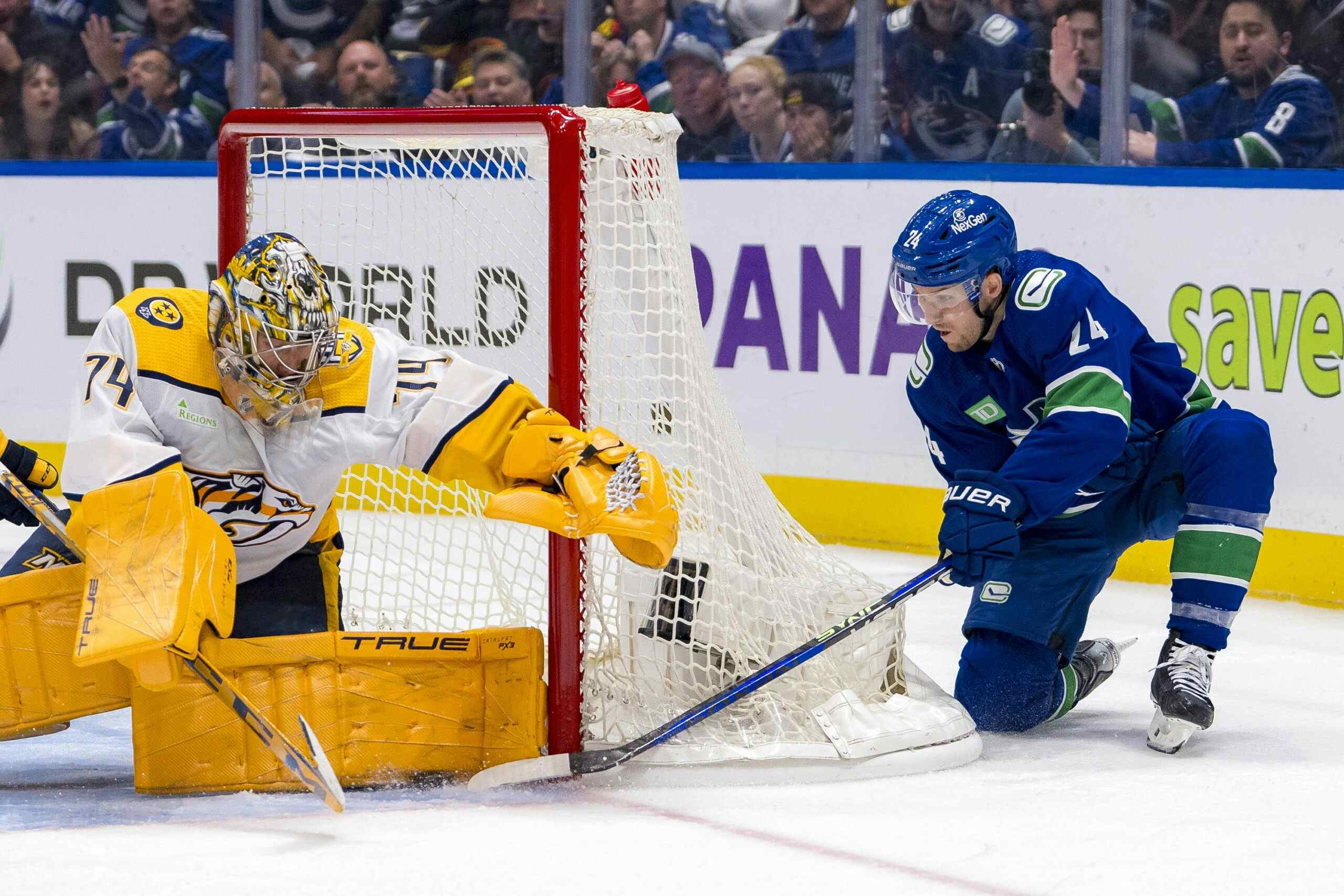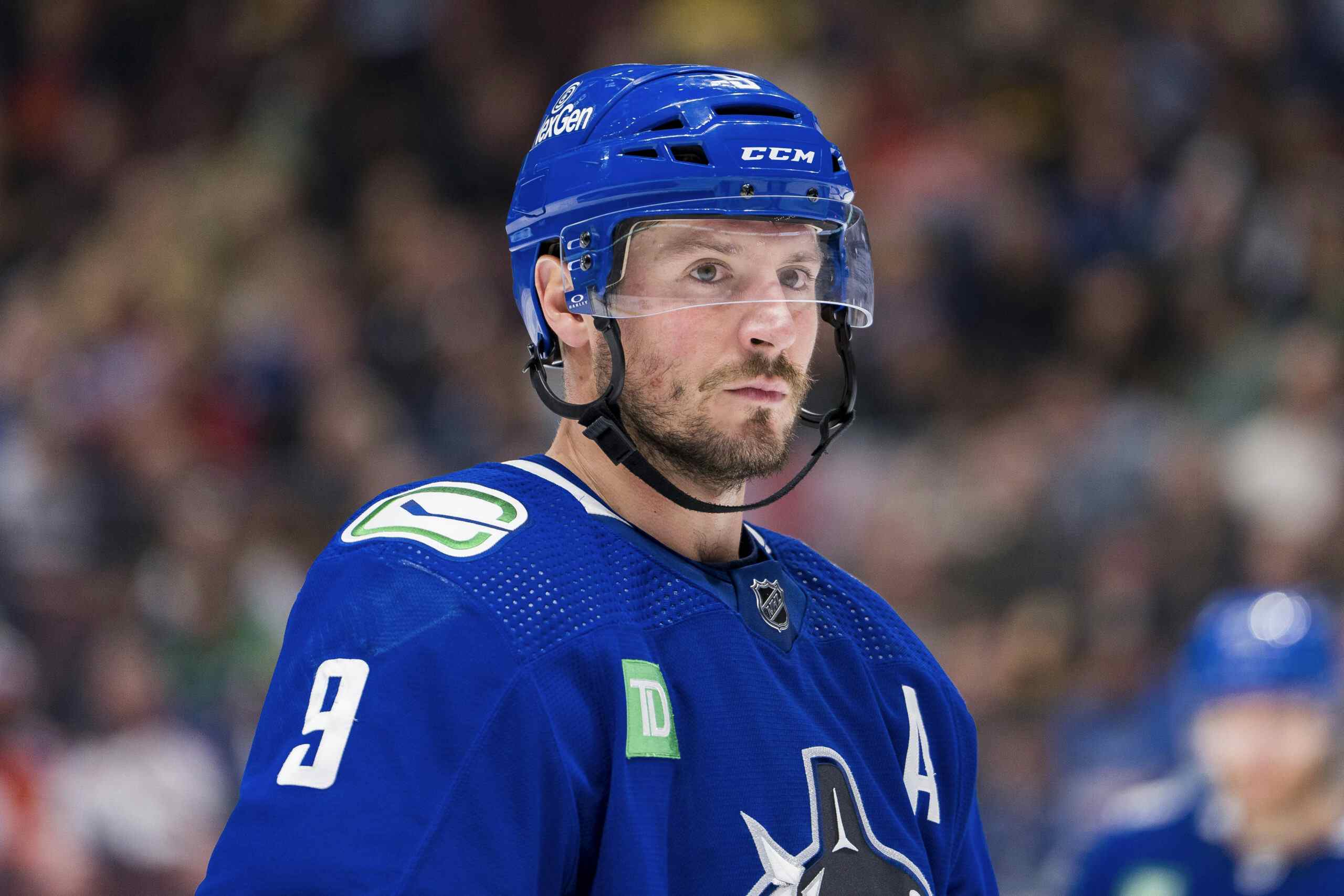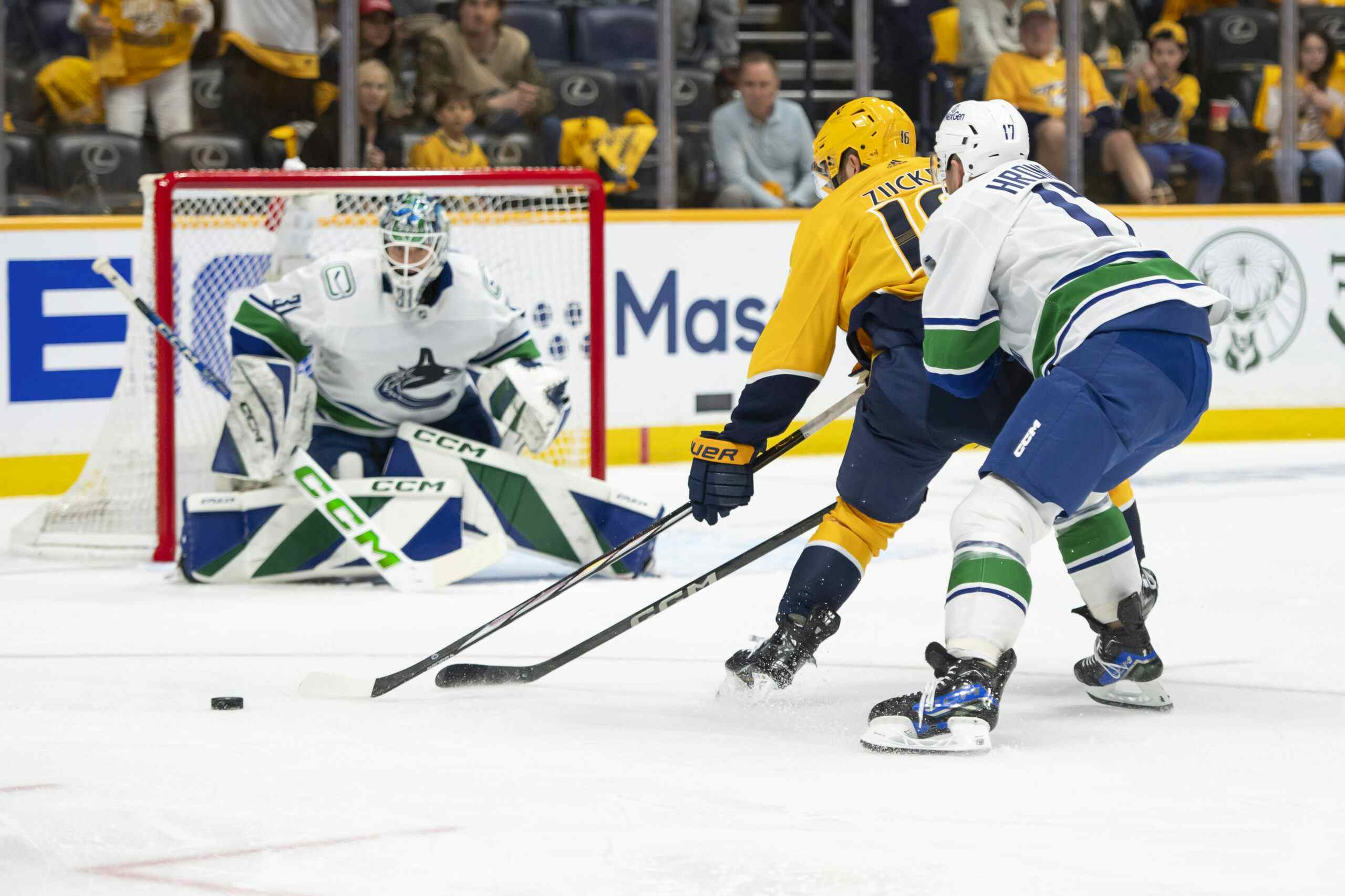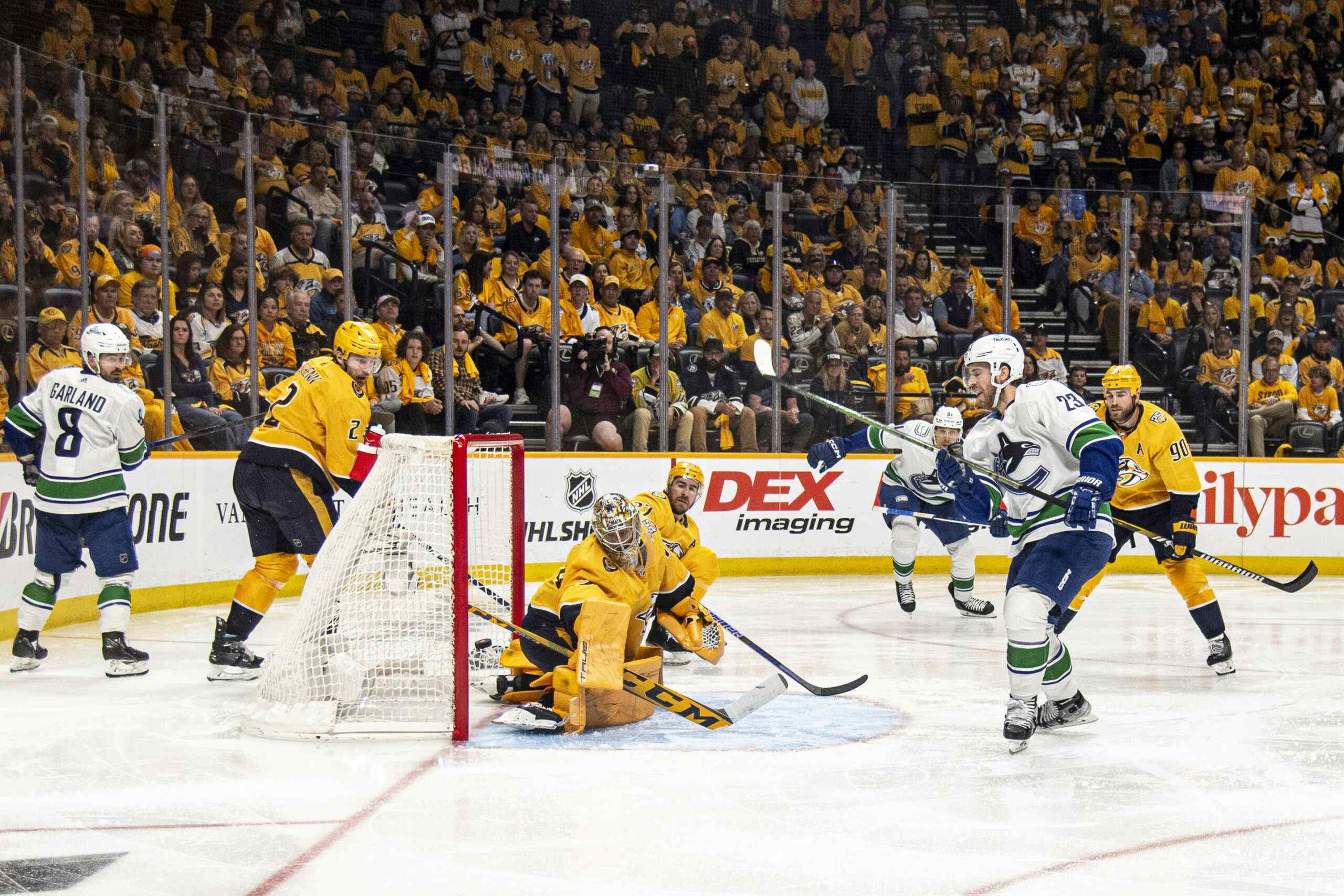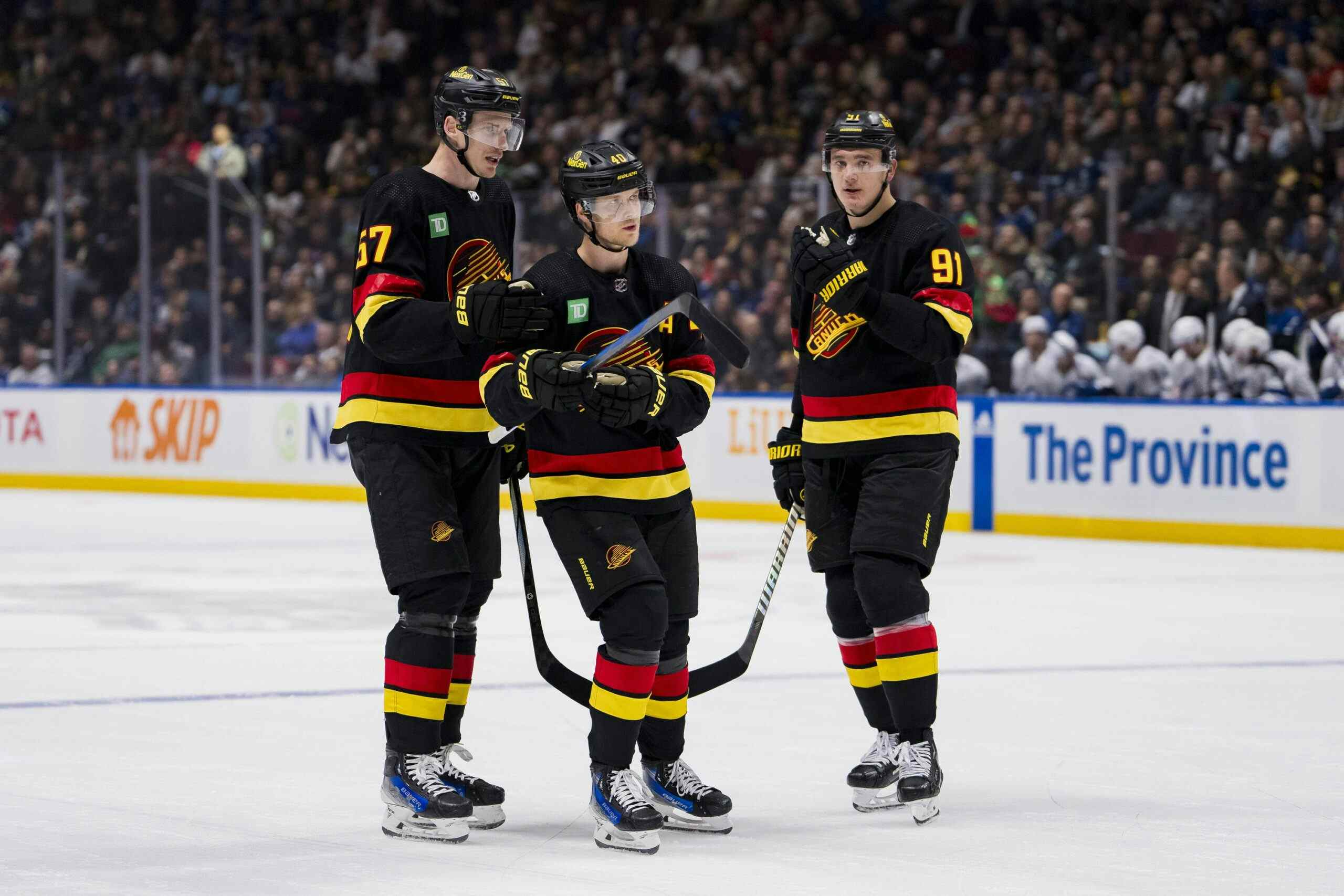Dr. Strangeglove or: How I Learned To Stop Worrying And Love The Canucks’ Burgeoning Goalie Controversy
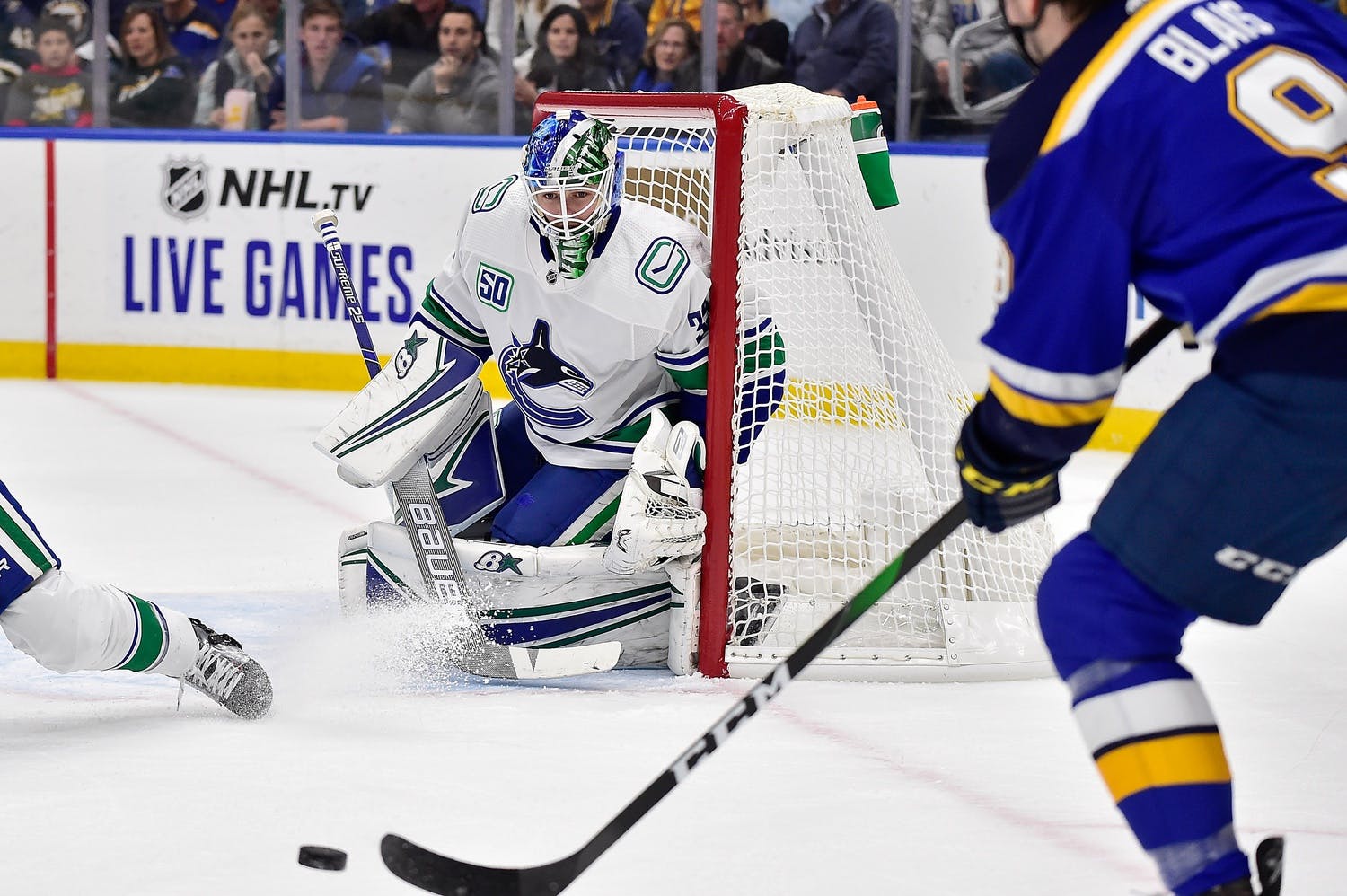
In the early stages of the 2019/20 season, the Vancouver Canucks find themselves on the verge of yet another goaltending controversy—something that has caused some understandable consternation among a fanbase still bearing the scars of World War Lu.
Fortunately, there’s no real reason to worry about the challenge Thatcher Demko is presenting to Jacob Markstrom’s starting position—and there’s plenty of reason for optimism when it comes to the burgeoning crease crisis.
For the purposes of this discussion, we’ll define a “goaltending controversy” as a situation in which a young(er) backup netminder threatens to surpass their elder teammate. There’s plenty of room for debate about whether or not such a set of circumstances should even be considered controversial, but there’s absolutely no doubt that they always will be in the Vancouver hockey market for obvious historical reasons—and so the definition will suit our purposes.
Any goaltending controversy is made infinitely more complicated if one or more of the goalies in question is approaching the end of a contract, and that’s exactly the position that Jim Benning and Co. are in at the moment. Add the impending Seattle Expansion Draft of the 2021 offseason, and you’ve definitely got yourself a perfect storm of headline-creating narratives.
Of course, it’s only a real goaltending controversy if the Canucks’ front office truly believes that both Markstrom and Demko are capable of being starting goaltenders for the foreseeable future—otherwise their decision becomes a lot easier. With that in mind, we’re going to first spend a little time establishing why Vancouver should believe in both of their netminders—and then we’ll explain why the fans shouldn’t fret about the situation devolving into a redux of the Luongo/Schneider debacle.
Jacob Markstrom: Early-Season Vezina Candidate
Through his first six games (4-2-0), Jacob Markstrom has put up some dazzling stats. As of this writing, he’s sitting at a GAA of 2.16 and a save percentage of .933—good enough for 14th and 12th place in the league, respectively. Both numbers are significantly better than the league average, and he ranks even higher when only starting goaltenders are considered.
But even that sparkling statline doesn’t paint a complete picture of Markstrom’s excellence throughout the first month of the season.
Vancouver has given up a roughly median amount of shots-per-game thus far in 2019/20, but the eye-test also says that Markstrom has faced scoring opportunities of an inordinately high quality as the rebuilt blueline has worked out its defensive kinks. He just returned from a personal leave without missing a beat, stealing two games against the New York Rangers and Detroit Red Wings that the Canucks probably didn’t deserve to walk away from with two points.
It should say a lot that Bo Horvat leads the team in goals and is on a 6-1 run as captain—and yet most would agree that Markstrom is the unanimous choice for early-season MVP. He’s also got a legitimate argument as an early-season Vezina candidate, at least according to some online pundits.
That all adds up to Markstrom being a clear-cut starting NHL goaltender—and more importantly, it also means that his play through the back-half of last season wasn’t a fluke. This looks like the new normal for the 29-year-old goaltender—and it doesn’t look like he’s slowing down.
Thatcher Demko: California Raisin’ The Stakes
There’s only a handful of goaltenders ranked ahead of Jacob Markstrom in the major statistical categories—and Thatcher Demko is one of them. The 23-year-old is currently tied for second in the league with a GAA of 1.64—and his fourth-place save percentage of .943 is nothing to sneeze at, either.
Admittedly, three games isn’t a very big sample size—nor is the entirety of his 13-game NHL career thus far—but the early returns are certainly promising.
They’re also not entirely surprising. Demko has long been heralded as the Canucks’ next one in net—and he’s been recognized leaguewide as a premier goalie prospect since his Draft+1 season. Demko’s path to big league success has been remarkably steady for someone playing a typically mercurial position—and there’s not much reason not to believe he’ll continue to progress.
Demko may not be ready for full-time starting duties quite yet, but he’s already playing at starter quality during a season in which he’s projected to play 20 or more games—which means, if the goaltending controversy hasn’t started already, it will in the immediate future.
But again, that’s actually a good thing.
Reason For Optimism #1: Markstrom Isn’t Going To Be Traded
The most immediate impetus for stressing about the Canucks’ situation in net is the fact that Jacob Markstrom’s contract expires at the end of the 2019/20 season, leaving him an unrestricted free agent. This leaves GM Jim Benning with three basic choices—re-sign Markstrom, try to trade him during the season, or let him walk in the offseason.
Luckily, there’s really only one choice that makes sense—and it’s re-signing the individual that has been Vancouver’s most valuable player for the better part of the past calendar year.
Trading the starting goaltender during a season in which the team has pledged to compete for the playoffs would send the wrong message to the fanbase unless the Canucks were way out of it by the Trade Deadline—which seems improbable at this point. There’s also the fact that starting goalies rarely move in-season, and when they do it’s often for an underwhelming return, making it all the more unlikely that anyone blows Benning’s doors off with the sort of offer that would make him reconsider.
There’s always the possibility that Markstrom prices himself out of Vancouver—but that doesn’t seem very likely either. A handful of monstrous goalie contracts have been handed out in recent years, but a Vezina Trophy win seems like a prerequisite. The rest of the market for starters falls between $5 and 6.5 million a season—and while Markstrom’s agent could certainly argue for a deal in the upper end of that range, the sum total of his work in Vancouver may not justify it.
For better or for worse, goalies still tend to be paid based on their record and their surface numbers—and in that regard, Markstrom has hovered around the league average for most of his time with the Canucks. A season and change of elite play probably doesn’t get him elite pay—and precedent states that he almost certainly won’t be getting a no-movement clause.
For his part, Thatcher Demko is signed for $1.05 million until 2021, after which he will still hold RFA status. By re-signing Markstrom, the Canucks would be postponing any decision between the two ‘tendies until 2021—though they’d also be accepting two more seasons of controversy-related media bites.
Reason For Optimism #2: Tandems Are Taking Off League-Wide
Having Jacob Markstrom and Thatcher Demko duke it out in the crease over the next two seasons will certainly be presented as a controversy in Vancouver—but maybe it shouldn’t be. Goaltending tandems in which both netminders are of starting quality—and in which the younger of the two is slowly-but-surely working on replacing the elder—are becoming more commonplace around the NHL.
In 2019/20 alone, all of Los Angeles, Nashville, New Jersey, and Washington find themselves in similar situations to what the Canucks are about to face—while several other teams are rolling with a combo of two veteran starters, including Arizona, Chicago, and Dallas. None of them seem to be in a particular hurry to change things up.
The Pekka Rinne/Jusse Saros tandem offers perhaps the best case study—and the best-case scenario—for what Vancouver could hope for from two more seasons of Markstrom/Demko. 2019/20 marks Saros’ fourth as Rinne’s backup, and he’s now on the cusp of taking over the starting role—despite a tough start to the year. The 2020/21 season will only mark Demko’s third as Markstrom’s backup, which means the Canucks’ tandem could feasibly last even longer than two more seasons—if not for the impending arrival of the Seattle expansion franchise.
Reason For Optimism #3: The Seattle Expansion Draft Is Two Seasons Away
When the Seattle TBAs make their selections in the 2021 Expansion Draft, the Canucks will only be able to protect one of their goaltenders, and that makes for an almost—but not entirely—unavoidable deadline for the organization to choose between Jacob Markstrom and Thatcher Demko. But 2021 is two full NHL seasons away, and that’s a lot of time to gather more data to inform their decision.
By June of 2021, the Canucks will have answers to a number of questions that they don’t at the moment—whether or not Markstrom is capable of carrying this team to the playoffs, whether he can maintain his current level of play over multiple seasons, and whether Demko will truly develop into the premier young starter most expect him to become. It may still be a tough choice, but the Canucks brass will at least be able to make a sounder decision than they’re able to in the current day—or that they’ll be able to make at the 2020 Trade Deadline.
Delaying the decision, in this case, makes it more likely that the Canucks ultimately make the right one.
Of course, there’s always the possibility that Canucks find a way to keep both goaltenders beyond the Expansion Draft. There’ll be plenty of solid netminders free for the taking, so Seattle may pass on taking Vancouver’s exposed goalie altogether. More optimistically-speaking, however, the Canucks could decide that it’s in their best interest to keep an elite goaltending tandem moving forward—and deal some assets to Seattle in return for them taking a skater instead.
Reason For Optimism #4: Both Goalies Will Increase In Value Between Now And 2021
The Canucks could also choose to forego the drama of the Expansion Draft altogether by trading one of Jacob Markstrom or Thatcher Demko sometime earlier in the 2021 offseason. For many reasons, this seems like the most probable ultimate outcome of the goaltending controversy in the long-run—not the least of which is the likelihood that both Markstrom and Demko will have increased their trade value by that time.
With a new team joining the fold in 2021—and numerous starters reaching their twilight years—that offseason promises to offer a stronger market for goalies than the last few have. That alone will ensure that either of Markstrom or Demko return greater value than they would at the 2020 Trade Deadline—but their level of play will also be a factor.
If Markstrom continues to play anywhere near as well as he currently is for the rest of the season and beyond, he’ll have gone a long way toward solidifying his reputation as a top-flight option in net. NHL GMs are traditionally slow to change their minds, and Markstrom has spent the bulk of his career looking highly questionable in the crease—so another year or so of résumé-building is only going to increase the price they’re willing to pay for him.
Similarly, Demko isn’t going to bring back quality assets with two dozen career games under his belt—but that will change quickly as he continues to push Markstrom for starts. It should go without saying that, ideally-speaking, two years of direct competition should push both goaltenders to greater heights—and that’s no doubt doubly true for Demko.
As such, the Canucks can get the most value out of the Markstrom/Demko duo—both in terms of on-ice play and trade return—by re-signing Markstrom and accepting the contentious narrative for at least the next two years. Fans would do well to follow the team’s lead in embracing the controversy—to stop worrying about the headlines and just enjoy the on-ice product.
Recent articles from Stephan Roget

